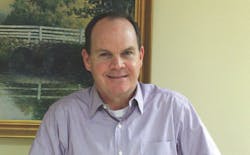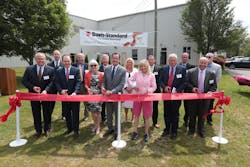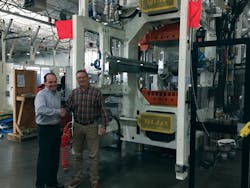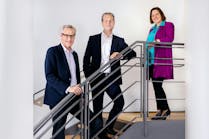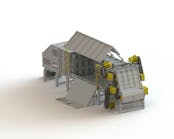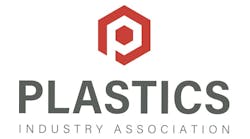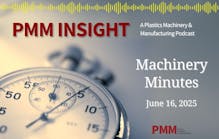By Bruce Geiselman
James Murphy grew up in Canton, Ohio, during the 1970s when the U.S. economy was struggling.
However, his dad had a good, steady job at Firestone Tire and Rubber Company for more than 45 years. Firestone at the time was headquartered about 24 miles to the north in Akron, Ohio – as were Goodyear Tire and Rubber, B.F. Goodrich and General Tire – giving rise to the city’s nickname as “Rubber Capital of the World.”
“When I was in grade school in the ’70s, they still built a lot of tires in Akron,” Murphy said. “I remember going on more than one field trip to Akron. At the time, you could take a tour of the tire plants. I always found it to be interesting.
“Growing up in the area, certainly in the late ’70s and the ’80s, the economy wasn’t great, but the plastics industry seemed to be an industry that was still growing and had opportunity for growth.”
After graduating with his bachelor's degree in chemical engineering in 1985, Murphy worked as a sales engineer for Battenfeld Extrusion Systems Inc. and NRM Corp. before taking a job in 1989 as senior sales engineer at Davis-Standard LLC, where he managed a territory that included Ohio, Michigan, Kentucky, Indiana, western Pennsylvania, and southern Illinois.
Murphy steadily earned promotions with the Pawcatuck, Conn.-headquartered extruder manufacturer, becoming the company president and CEO in 2015. He headed the company until earlier this year when he transitioned to vice chairman of the board of directors.
Murphy discussed his career path, and what led to his departure as president and CEO with Plastics Machinery & Manufacturing Senior Reporter Bruce Geiselman.
Where did you go to college, and what was your major?
Murphy: I graduated from the University of Akron with a B.S. in chemical engineering.
My first year, I went to Miami University in Ohio. At that point, I was unsure of what exactly what field I wanted to pursue, which probably isn't that unusual with 18-year-olds. I was in a course of study called pre-engineering. Miami at that time didn’t really have a full engineering school. Somewhere along the way, in my freshman year, I decided I wanted to pursue chemical engineering, and I decided Akron was probably a better spot for me.
What I think attracted me to chemical engineering was some of the focus on polymers. At that time, on the undergrad side, you could take a few classes in polymer science and polymer processing, but there was no bachelor’s program dedicated to polymer engineering or polymer science. That was an area that interested me.
I was interested in the industry. It just seemed like something that fit my interests. I always enjoyed chemistry when I was in high school, and then in college, I thought I could make a living doing it.
How did you end up at Davis-Standard?
Murphy: At NRM [a former extruder manufacturer later purchased by Davis-Standard], I was in a field-sales role initially in the Southeast, which was when I joined the company. After about a year with the company, there was an opportunity to relocate back to the Midwest, to Ohio, which was a stronger territory at the time and a chance to relocate back toward home. That was something I chose to do.
After about a year and a half or so in that territory, I got a call from a recruiter that Davis-Standard, looking for somebody for that territory. I took an interview and ultimately was offered a position and started with them in the fall of ’89.
In ’95, I was promoted to the role of business manager for the pipe and profile business. That’s a management position that is responsible for the product line, which included all the salespeople and all the design engineers you needed to facilitate those orders and get them into manufacturing.
That was my first real opportunity to have commercial responsibility — profit and loss responsibility — for a product line. That was a big change coming from managing yourself and a sales territory. Now, I had to manage a small group of about 18 people. It was my first management experience. It was great experience, and a lot of learning happened in those first few years.
[Murphy progressed to business director of pipe and profile, elastomer, and wire and cable; VP of sales; president of extrusion systems; and VP of sales and product management before becoming president and CEO in 2015.]
What prompted your decision to pursue an MBA?
Murphy: That was always an interest of mine, to get some more formal business education.
The program I went through at Kent State was an executive program. It was about a 30-month program, and it was what they call a cohort program. You started with a class of 30 to 35 students, and you finished with that same class, and you did all the classes together. To be accepted, you had to have five or six years’ minimum business experience, so the class was filled with people that were in the workforce with different areas of experience.
You went to classes year-round with Christmas breaks and then an abbreviated summer break.
At the time, I was working for Davis-Standard. I was in a field-sales role. I was living and working from my home, in Canton, Ohio, but I was traveling probably 60 percent to 80 percent of the time and covering a territory, but Davis-Standard has a program where they reimburse employees if they choose to pursue educational opportunities.
I was interested in a little bit more business education that I didn’t really have in college. It was a good time to do that kind of thing where you could spend half your weekend working on that. It was a good way to continue doing your work and get some education at the same time.
When you joined Davis-Standard, did you ever envision that you would become president and CEO?
Murphy: Probably not at that time, no. I think my aspirations would have been to just do well at the role I was taking on.
I certainly had aspirations to grow beyond being a field salesperson, which I really enjoyed, but maybe into a sales manager role, which was the next role that was typical if you went up the ranks. That was probably my aspiration at that time, but, certainly, I was always interested in looking at opportunities to take on more responsibility. I always found that to be challenging. With it came an opportunity to learn new things, put yourself into a different role where there are different challenges. I found that to be interesting and an opportunity to push yourself to learn and to grow beyond where you were comfortable.
Murphy: As the leader of the company, you have a lot of responsibilities, but my ultimate responsibility was to make sure that we best positioned the company for growth, and making sure that we were employing the right strategies to look for profitable growth so that we could maintain our market position and not do anything to compromise the good work and goodwill that the company had built over the years.
David-Standard has always been a customer-focused organization. Ultimately, our customers come to us for extrusion process technology and support for equipment over its useful life.
Customers, as they’re evaluating potential suppliers for their new machinery, they’re trying to understand who has the most innovative approach to problem-solving, who can offer them the right technology that drives the best productivity in their operations, and then what the ongoing cost of operating that equipment looks like. That's an important part of their decision-making process. That’s where it’s important to build a network that can support the customer.
That is really a strength of Davis-Standard, in that the company has been around over 170 years and building extrusion equipment over 100 years. The company continues to support equipment that’s 20, 30, 40 years old on a regular basis. They maintain the engineering records, and they have the capability to support the customer. Ultimately, customers appreciate that, and I believe that’s what’s led to the success that the company has had and will have as Davis-Standard continues to offer the best value to its customers.
What did you find most rewarding during your tenure at Davis-Standard?
Murphy: I’m proud of the fact that during my seven years as a CEO, we were able to double the revenue of the company and the size of the company.
When I started, there were about 700 employees. We doubled that to about 1,400. Along with that, we more than doubled the sales of the company. That’s a sign of a healthy business. And along with doubling the revenue, we had stronger improvement on the profitability side.
Companies, to be successful, need to invest in the right technologies; they need to generate sales; they need to grow, and then they need to be able to generate a profit such that they can reward their stakeholders, including all their employees, but then they also need to reinvest in the business so the business can continue to find new opportunities for growth and can continue to evolve.
One of the things I always found most satisfying was that when I think of those 1,400 jobs, those are 1,400 families that counted on Davis-Standard for at least part of their livelihood. That was a very significant responsibility, and something that the management team was always keenly aware of.
When we went through soft times, when we went through a period like the COVID [pandemic] in early March [2020], those can be very trying times for businesses, and the management team was always able to work with employees so that we found ways to manage our costs, tighten our belts, and be able to get through the tough periods and be able to still have a solid team in place when business improved.
That was always very rewarding, to have the opportunity to be part of a business that was growing, not wildly growing, but steadily growing, and being able to expand our capabilities in terms of the geography that we are able to serve, which now is global. We’re well-positioned to service all our customers globally and to really build some key strategic strength in several key markets, which includes wire and cable, where the company is a global leader, technical tubing applications for things like fiber optics and medical. In some of those key areas, the company has great strength and strong market share.
Some other important markets are on the packaging side for sheet extrusion, thermoforming and extrusion coating. Those were exciting things to be a part of as we thought about how we wanted to grow the company, and then to be able to execute it with the entire team and see that come to fruition was very rewarding.
What led to your departure as the president and CEO and your election as vice chairman of the board of directors?
Murphy: Davis-Standard is a private company. Since 2005, Davis-Standard has had a private equity partner, and that partner has changed a couple of times over the years. In December of last year, as it’s been reported, ONCAP, which was the company’s private equity partner, sold the company to Gamut Capital Management, which is a New York-based private equity firm.
Through some discussions and thinking about where the company is and where personally I was, it seemed to be a good time to think about making this change, where I would move into less of a day-to-day role but still be involved with company on the board level, more of a strategic level. We identified a CEO who had some very relevant experience and a skill set who we thought would be a great leader for the company for the foreseeable future. It was just a point in time where some things changed, and personally and professionally, it was an opportunity to make a change, which we all thought was a good idea.
What will be your duties in your new role on the board of directors?
Murphy: The board’s there to support management, and as management looks to identify strategic growth opportunities, the board is there to work with management as a sounding board.
Ultimately, the board represents the shareholders and is there to make sure that the plan for growth that the company has is well-funded from an investment standpoint and then a solid execution plan is in place to enable the growth.
What will be the future for James Murphy — are you looking for another career in plastics?
Murphy: At this time, I’m very satisfied with the role I continue to have at Davis-Standard. That’s really my immediate plan. Personally, I’m doing a few other things outside of the industry, but minor things. Most of my focus continues to be on supporting Davis-Standard as vice chairman of the board.
What trends are you seeing in the plastics industry?
Murphy: We have seen and continue to see strong growth in terms of investment in new equipment in the industry.
That’s a strong trend that's been in place now since the second half of 2020. It’s going on almost two years now ... a very significant uptick in activity in investment in this type of equipment. In terms of what’s driving that, I think for a portion of the time, you saw increased consumer demand, but we’re also seeing an investment in reshoring activities as people look to shorten some of those supply chains that have gotten longer and more stretched over the years. They’re looking to make investments here in North America to be able to shorten those supply chains and put in place key manufacturing that’s needed for key types of materials, particularly on the medical side.
There are also some strong drivers that maybe are specific to Davis-Standard’s product portfolio around alternative energy. The company has invested in and has a very strong market position in wire and cable. When you see solar farms or wind turbines, that is where energy is being created. Once created, it needs to be connected to the grid to be useful. Davis-Standard has a very strong market position in power distribution cable. There’s a lot of investment activity in this industry.
Another key area where we’re seeing a lot of growth is around the rollout of 5G. As you’re seeing 5G rollout, there’s a lot of fiber-optic capacity, which is an area where the company is very active, both on the wire and cable side, and on the pipe and tube side. All those fiber-optic cables get jacketed with a polymer material, and, ultimately, when they get installed in the field, they’re installed in a duct or a pipe or a tube.
Murphy: Like most manufacturing businesses, it was pretty significant.
We have a plant in Suzhou, China, which is about 100 miles to the west of Shanghai. I remember in January of 2020, we’d be on the phone with regular reviews with the team there, and they’re reporting news about COVID in China. As I recall, Chinese New Year was at the end of January that year, and they went to Chinese New Year, which is usually a one-week holiday. I think they were out three to four weeks because the Chinese government shut things down due to COVID outbreaks.
By then, it was obvious that this was coming; this was starting to be something we were going to deal with here in the U.S. by the end of February. Then, by the middle of March, we’re being ordered that if people can work at home, do work at home. We were trying to figure out what that means to us as a business. We were having customers contact us to provide us information so we could file with the states that we were an essential manufacturer because we were supporting customers in the medical industry that were supporting the COVID efforts; we were supporting customers in food packaging, and everybody was still going to need to eat through this whole thing. It was a very challenging time.
By the middle of March, everybody that could work remotely, we had working remotely. That’s everybody in the office, for the most part, certainly all the engineers, all the salespeople, and the support people like accounting and HR and all the other functions.
In the meantime, we still had to run the plants. Every day, the guys that worked in the shop had to come to work, and the supervisors had to come to work. It was a challenging time. It took us a good 30 days to get that working reasonably well.
We were surprised how well our systems held up. On the IT side, which we had invested in over time, people were pretty quickly able to do their work efficiently, while the teams in the shop were able to continue to go in and do the work they needed to do to be able to supply customers with products and ship them out. It was a very challenging time. For the guys that had to go in every day, we did our best to provide them with any and all support they needed. Without their dedication and without their effort to go into the factory each and every day, we wouldn’t have created the products that our customers wanted. That’s ultimately how the company generates sales revenue. That’s what we needed to do to stay in business and support our customers. Everybody worked together as a team, and it got done.
By July, we were all back in the office. But for three months or four months, it was a pretty challenging time.
How has the extruder manufacturing industry evolved?
Murphy: Certainly, the technology continues to evolve. We always think about the technology evolving.
You see that particularly on the equipment side in terms of process technology, improved screw designs, higher-throughput capabilities. You see that on the materials side, where you have more durable materials that are easier to process. We’ve seen it in the last few years, and we’re going to see it in the coming years.
There’s going to be much more focus on sustainability. You’re starting to see that in terms of people really wanting to understand the recyclability of materials. Part of that is product design. And then, what’s the recyclability if you have multi-layer materials? I think a significant focus for the industry going forward will be around sustainability.
On the equipment side, I think you’re going to continue to see evolutionary changes, always driving toward improved productivity, improved energy efficiency. There are a lot of techniques and technologies evolving there, but I think the big one that is going to really drive the most benefit for the industry will be around the Internet of Things, and the ability to really capture more data from the equipment and then be able to utilize artificial intelligence tools to be able to better understand the data and find those trends in the data, so that the operator can better understand how to control the process and then suggest those tweaks that are needed to drive better productivity.
Those products and those technologies are being worked on now. I would say they’re in their early stages today, but over the next several years, we’ll start to see more investment and bigger benefits going forward.
What does the plastics industry need to do to improve its image?
Murphy: The Plastics Industry Association just made a change in leadership with Matt Seaholm and Glenn Anderson taking leadership roles with PLASTICS, and both have a good understanding of the industry’s challenge to improve its public perception. That’s clearly an area where the industry needs to pull together to get the right message out because I believe that there’s a lot of good science and a lot of good work that’s been done, but, unless we get that out in front of the front of the public and make our case, the industry will continue to suffer from negative public perception.
In your early years in business, who was your mentor? Whom did you admire and why?
Murphy: During my career, I had three people that I would consider mentors.
First would be Al Hodge. At Davis-Standard, he was my direct supervisor for the first 13 years when I was with the company. He’s retired now, but Al was always a great supporter and willing to spend time when I didn’t understand something. I really appreciated his help over the years.
Bob Ackley was a CEO during my first 16 years at Davis-Standard. Bob has always been and continues to be somebody who is always available when you need advice.
And then in the latter part of my career, after Bob left, there was a gentleman by the name of Charlie Buckley, who was the CEO, and Charlie was also someone who was a mentor in terms of particularly how to think through strategy and those kinds of topics. That’s an area where Charlie was particularly strong.
How would you like to be remembered? What legacy do you want to leave behind?
Murphy: Over the years, Davis-Standard and the industry have been very good to me and my family.
During my time at Davis-Standard, when I did some work for the Plastics Industry Association, I tried to participate in things where I felt I could give back and be part of what the industry is trying to do.
What I’ve always tried to do in terms of my work life is bring your best effort to your job each and every day. Give your best, and, as you make decisions, get all the information, think it through and make decisions that you’re comfortable with that are fair and in the best interests of all. It’s hard to do, but you want to find the win-win answer — what’s good for the company, what’s good for the employees, what’s good for our customers?
When you find those win-win solutions, those are the right answers because those are sustainable. Those are things that people get behind. Probably, those are things you have to work hard to find, but it’s really about working collaboratively and finding those win-win solutions that are sustainable.
Bruce Geiselman
JUST THE FACTS
Who is he: James Murphy, vice chairman of Davis-Standard’s board of directors and former president and CEO
Age: 59
Education: Bachelor of Science, chemical engineering, University of Akron; Master of Business Administration, Kent State University
Company headquarters: Pawcatuck, Conn.
Company founded: 1848
Employees: 1,400
Bruce Geiselman
Senior Staff Reporter Bruce Geiselman covers extrusion, blow molding, additive manufacturing, automation and end markets including automotive and packaging. He also writes features, including In Other Words and Problem Solved, for Plastics Machinery & Manufacturing, Plastics Recycling and The Journal of Blow Molding. He has extensive experience in daily and magazine journalism.

